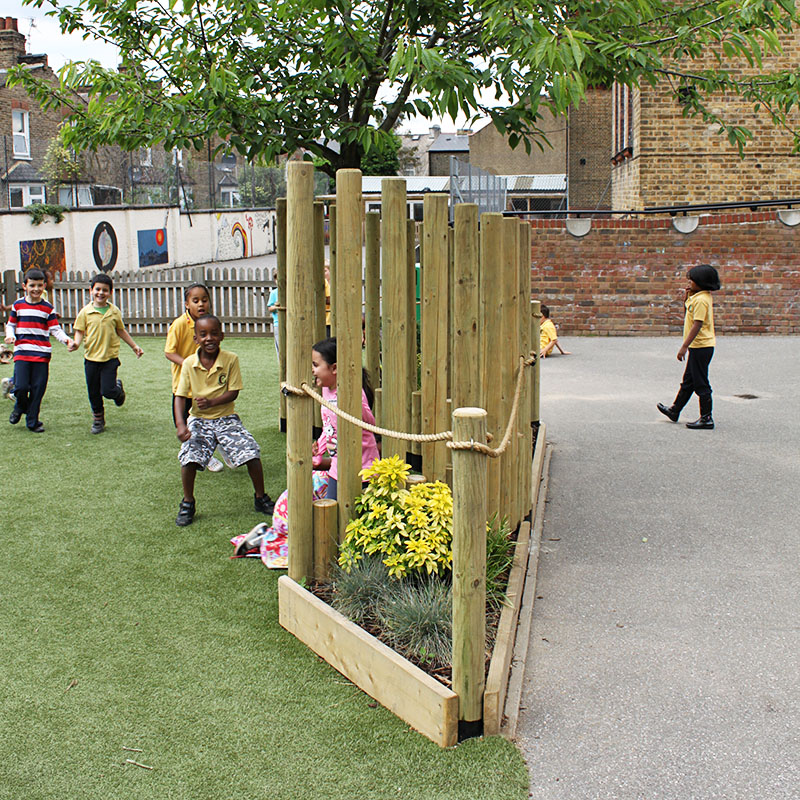Play Naturally, Thrive Uniquely: Encouraging Social Interaction

In the first part of our multi-part article on the magic and benefits of natural playgrounds we introduced the ‘Natural Playgound’. In the second, child development, physical activities and motor skills.
Now we’re taking a look at social interaction.
Encouraging Social Interaction
Social interaction is a key aspect of children’s social development, and natural playgrounds provide an ideal setting for fostering social skills and teamwork. These playgrounds offer valuable opportunities for children to engage in social interactions, collaborate, and develop important social competencies. In this section, we will explore the importance of social interaction, the opportunities for interaction and play in natural playgrounds, and the benefits of connecting with nature while engaging in social activities.
A. Importance of Social Interaction for Children’s Social Skills and Teamwork
Social interaction plays a crucial role in children’s social development. Natural playgrounds provide valuable opportunities for children to engage in social interaction and develop essential social skills. Through collaborative play, children learn how to communicate effectively, negotiate, and cooperate with their peers. They develop an understanding of sharing, turn-taking, and resolving conflicts, which are vital for building positive relationships and working in teams.
By interacting with others in the context of play, children learn to navigate social situations, understand different perspectives, and develop empathy. These social skills are transferable to various aspects of their lives, including school, family, and future social interactions. Natural playgrounds create an environment that supports the development of social competence and lays the foundation for healthy social relationships.
B. Opportunities for Interaction and Play with Others in Natural Playgrounds
Natural playgrounds offer spaces and features that naturally facilitate social interaction among children. Play elements such as sandboxes, water play areas, and group seating areas encourage children to engage with others in cooperative play. These spaces become gathering points where children can interact, share ideas, and collaborate on creative endeavors.
In natural playgrounds, children engage in imaginative play scenarios together, such as building sandcastles, creating imaginary worlds, or working together on construction projects using natural materials. The open-ended nature of the play environment allows for diverse play scenarios, fostering a sense of camaraderie and shared experiences.
Additionally, natural playgrounds provide opportunities for group activities, such as cooperative games or team challenges. Children can engage in activities that require joint problem-solving, communication, and coordination. These experiences help children develop teamwork skills, learn to respect others’ ideas, and build a sense of unity and cooperation within a group.
C. Benefits of Connecting with Nature while Engaging in Social Activities
Combining social interaction with nature-based play in natural playgrounds offers unique benefits. Research has shown that spending time in natural environments enhances social connectedness, empathy, and prosocial behaviour. When children interact with nature together, they develop a shared appreciation for the natural world, fostering a sense of unity and environmental stewardship.
Connecting with nature also provides a context for shared experiences and shared awe, which can deepen social bonds and promote positive social dynamics. Children can explore the natural environment together, observe and discuss plants, insects, and animals, and engage in discussions about the wonders of nature. These experiences create opportunities for conversations, storytelling, and the exchange of knowledge and ideas.
Furthermore, nature-based play encourages a sense of responsibility and care for the environment, fostering a sense of empathy towards living beings and promoting sustainable behaviors. Children learn about the interdependence of humans and nature, leading to an increased sense of connectedness and social responsibility.
In conclusion, natural playgrounds offer rich opportunities for social interaction, providing a space where children can develop essential social skills, collaborate with peers, and form meaningful connections. By combining social interaction with nature-based play, natural playgrounds promote social competence, empathy, and a deeper appreciation for the natural world.
So, in this third part, we have looked at encouraging social interaction through play. In the next and final part, our article looks at the design and features of natural playgrounds.
